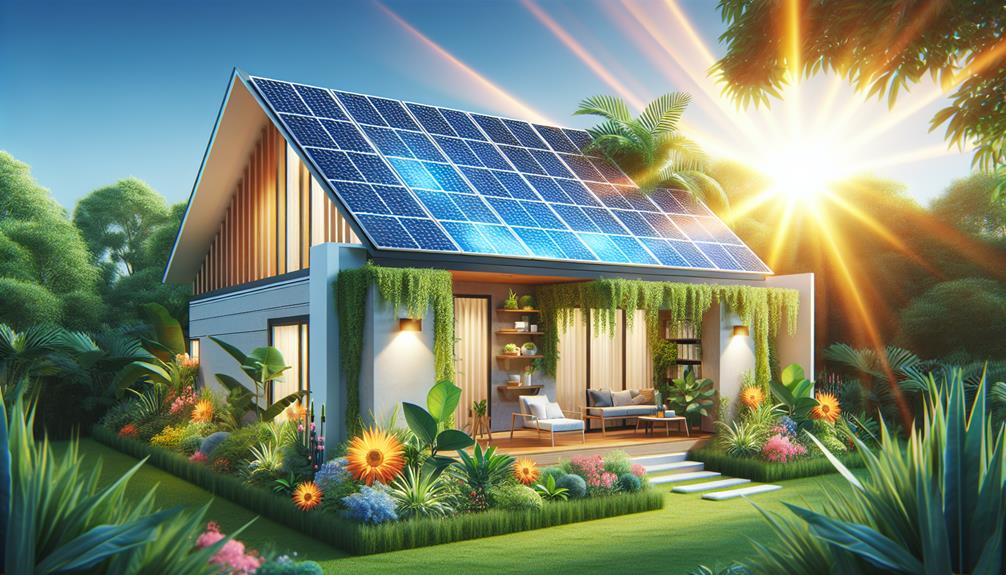Do Solar Panels Actually Save You Money
Are solar panels truly a cost-effective investment for your home? Well, let's just say that installing solar panels can have some rather intriguing financial perks.
Do Solar Panels Actually Save You Money
From lower monthly energy bills to tax incentives and rebates, the potential for increased home value and long-term savings on electricity costs, the benefits seem to be quite enticing.
Do Solar Panels Actually Save You Money
But before you jump to conclusions, there's more to the story that might just leave you wondering if solar panels are truly worth it.
Do Solar Panels Actually Save You Money
Lower Monthly Energy Bills
Do Solar Panels Actually Save You Money
Lower your monthly energy bills by installing solar panels on your property. Solar panels harness the power of the sun to generate electricity for your home, reducing your reliance on traditional energy sources and ultimately saving you money. When you install solar panels, you immediately start generating your own electricity, which means you can reduce or even eliminate your monthly energy bill.
Do Solar Panels Actually Save You Money
By investing in solar panels, you can take advantage of the abundant and free energy from the sun. The panels convert sunlight into usable electricity, offsetting the amount of power you need to purchase from your utility company. As a result, your monthly energy bills decrease significantly.
Do Solar Panels Actually Save You Money
The savings from solar panels can vary depending on factors such as the size of your system, your energy consumption, and the amount of sunlight your property receives. However, studies have shown that homeowners who switch to solar can save hundreds or even thousands of dollars each year on their energy bills.
Do Solar Panels Actually Save You Money
Additionally, many governments and utility companies offer incentives and rebates to encourage the installation of solar panels. These financial incentives can further reduce the cost of your solar system and increase your overall savings.
Tax Incentives and Rebates
Take advantage of tax incentives and rebates to maximize your savings when installing solar panels. In many countries, including the United States, there are various incentives and rebates available to encourage individuals and businesses to switch to solar energy. These incentives can significantly reduce the upfront costs of installing solar panels, making them more affordable and accessible to a wider range of people.
One of the most common tax incentives is the federal solar investment tax credit (ITC). This credit allows you to deduct a portion of the cost of installing a solar energy system from your federal taxes. Currently, the ITC allows for a 26% deduction on the total cost of the system, including equipment and installation. However, it's important to note that the percentage will decrease to 22% in 2023 and will be completely phased out for residential installations by 2024.
In addition to the federal ITC, there may also be state and local tax incentives and rebates available to you. These can vary depending on where you live, but they often provide additional financial benefits to further reduce the cost of going solar. Some states, for example, offer cash rebates or grants that can be applied towards the installation costs.
To ensure you take full advantage of these incentives and rebates, it's recommended to consult with a tax professional or solar installer who's knowledgeable about the available programs in your area. They can help you navigate the complex tax codes and paperwork required to claim these benefits.
Increased Home Value
When considering the financial benefits of installing solar panels, one important aspect to consider is the potential increase in your home's value. Solar panels have become increasingly popular among homeowners due to their ability to generate clean and renewable energy. As a result, homes with solar panels are often seen as more attractive and desirable in the real estate market.
Studies have shown that homes with solar panels tend to have a higher resale value compared to homes without them. According to a report by the Lawrence Berkeley National Laboratory, homes with solar panels typically sell for a premium of about 4% compared to similar homes without solar panels. This means that if your home is valued at $300,000, solar panels could potentially increase its value by $12,000.
The increased home value can be attributed to several factors. Firstly, solar panels offer long-term savings on electricity bills, making the property more affordable to maintain. Additionally, solar panels can improve a home's energy efficiency and reduce its carbon footprint, which appeals to environmentally-conscious buyers.
Moreover, solar panels are seen as a valuable investment that can provide a reliable source of electricity for years to come. Homebuyers recognize the potential financial benefits of owning a home with solar panels, which can further drive up the value of your property.
Investing in solar panels not only helps you save money on electricity bills but can also increase the value of your home. It's a win-win situation that can provide both immediate and long-term financial benefits.
Long-Term Savings on Electricity Costs
By installing solar panels, you can significantly reduce your long-term electricity costs. Solar energy is a renewable source that allows you to generate your own electricity, reducing your dependence on the grid and the need to pay for electricity from traditional sources.
The initial cost of installing solar panels may seem high, but over time, the savings on your electricity bills can outweigh the upfront investment. Solar panels convert sunlight into electricity, which can power your home and appliances. When your solar panels produce more electricity than you need, the excess energy can be stored in batteries or fed back into the grid, allowing you to earn credits or receive payments from your utility company. This means that during periods when your solar panels aren't producing enough electricity, such as at night or during cloudy days, you can still rely on the grid or your stored energy without incurring additional costs.
Over the years, as electricity prices continue to rise, your solar panels will continue to generate free electricity, resulting in long-term savings. The exact amount of savings will depend on factors such as the size of your solar system, your energy consumption, and the local electricity rates. However, it's estimated that homeowners can save thousands of dollars over the lifetime of their solar panels.
In addition to reducing your electricity costs, solar panels also come with long warranties, typically ranging from 20 to 25 years. This means that you can enjoy the benefits of reduced electricity bills for many years to come, without worrying about major maintenance or replacement costs.
Return on Investment (Roi) in the Long Run
If you're wondering about the financial benefits of installing solar panels, let's now explore the return on investment (ROI) you can expect in the long run.
Investing in solar panels can yield significant returns over time. While the upfront costs may seem substantial, the savings on your electricity bills can help recoup your investment. On average, it takes about 7 to 20 years for homeowners to recover their initial investment, depending on factors such as location, energy usage, and the cost of electricity. After the payback period, you can enjoy free electricity for the remaining lifespan of your solar panels, which typically range from 25 to 30 years.
Moreover, solar panels can also generate additional income through net metering or feed-in tariffs, depending on your location. Net metering allows you to sell excess electricity back to the grid, while feed-in tariffs provide a fixed payment for every unit of electricity your panels produce. These incentives can further enhance your ROI and accelerate the payback period.
Additionally, investing in solar panels can increase the value of your home. Studies have shown that homes with solar panels sell faster and at a higher price compared to those without. This means that if you decide to sell your property in the future, you can potentially recoup a significant portion of your initial investment.
Conclusion
In conclusion, solar panels can indeed save you money.
Lower monthly energy bills, tax incentives and rebates, increased home value, and long-term savings on electricity costs are all benefits of investing in solar panels.
With lower monthly energy bills, you can significantly reduce your reliance on traditional energy sources and save money in the process.
Additionally, there are various tax incentives and rebates available for homeowners who invest in solar panels, which can help offset the initial installation costs.
Furthermore, installing solar panels can increase the value of your home. Many homebuyers are increasingly interested in properties with solar panels, as they offer long-term savings and environmental benefits.
Overall, investing in solar panels can provide a solid return on investment in the long run. So, if you're looking to save money and reduce your carbon footprint, installing solar panels is a smart choice.

